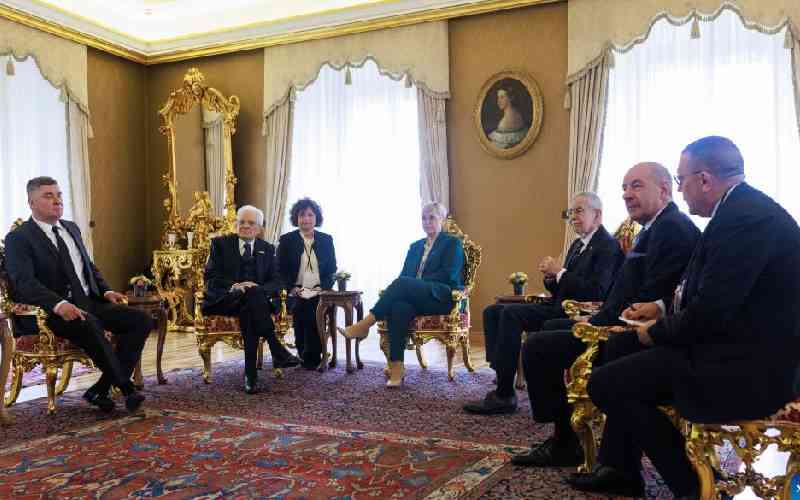There was a mad rush to get space to sit or stand in a room where journalists at the Guardian’s London headquarters hold their editorial meetings at 10am.
“This feels like the General Election,” someone close by whispers to no one in particular as reporters, editors and other newspaper staff leave after being asked to move to a larger room downstairs.
Although pollsters had termed the June 23 referendum too close to call, there was a faint whiff of hope in London, the heart of Britain that the UK would wake up in the European Union.
It seemed, to many, the most logical position. The International Monetary Fund had a week earlier warned that a Brexit vote would trigger a recession.
World Bank President Jim Yong Kim warned that a possible UK exit from the EU is one of the biggest risks to the global economy the bank has faced, with developing countries poised to lose the most. Ten Nobel-prize winning economists advised that a Brexit vote would create a future of uncertainty between the UK and Europe with effects persisting “for many years”.
Even NATO had warned that Britain’s presence in the EU was vital to peace and stability in Europe and crucial in the fight against the Islamic State.
World leaders led by Germany Chancellor Angela Merkel and US President Barack Obama had urged Britain to stay in the EU and work from within to solve the challenges facing the western world.
Geoff Russell-Jones, a London lawyer, who works part-time as an actor, had told me it would be ludicrous for the UK to vote any way but Remain.
“Every time we are with a group of people talking about Brexit, everyone says they are going to vote Remain and I often find myself having to say I am in Leave just to create a debate,” he told me three days before the referendum.
Michael Binyon, a Cambridge-educated journalist with more than 35 years in journalism under his belt, acknowledged the sharp split but downplayed the chance of a Brexit. “It seems a bit close as the polls are telling us but there is so much noise right now and so many people are fatigued and angry, but I believe that at the last minute, when faced with the ballot paper alone in the voting booth, most people will listen to their conscience and vote Remain,” he told me two weeks before the vote.
And this seemed to be the case when polls closed at 10.00 pm local time and vote tallying started in 382 local tallying centres across England, Scotland, Wales and Northern Ireland.
Investors had hedged on a win for Remain and the FTSE 100 was on a two-month high when the markets closed on Thursday evening as the pound rose to a six-month high against the US dollar and rose further at 11pm as the first returns indicated an early lead for Remain.
As more results trickled in over the next four hours, the blue and yellow bars for Leave and Remain respectively seemed to be stuck at 50 per cent on the websites of most news organisations watched intently by either side.
At 3 am Remain campaigners started to look grim as voter turnouts in their strongholds appeared less than anticipated and the Leave basket collected more votes in the same regions.
At 3. 30 am, with tallying completed in 160 out of 382 counting centres, Leave emerged ahead collecting 51 per cent of 17 million votes out of 33 million votes counted. The pattern remained consistent over the next hour and with dawn breaking the BBC projected at 4. 40am that the UK had voted to leave the EU to the shock of the entire world.
Stay informed. Subscribe to our newsletter
As the world comes to terms with the Brexit results and Europe ponders its fate there are some key lessons to be learnt from last Thursday’s UK referendum.
The first is that expedient political gambles for short-term almost always lead to disasters for voters. In 2013, David Cameron was facing rising rebellion from within his Conservative party over Britain’s position in the EU.
The rise of the now-popular UK Independent Party, UKIP further made things worse for the Premier who had moved into 10 Downing Street two years earlier through a hung parliament and was in an uneasy coalition heading for another election.
To still the waters in his party and prevent being grounded in Parliament, Cameron promised an in-out referendum to determine whether Britain would stay in or out of the EU.
 The Standard Group Plc is a
multi-media organization with investments in media platforms spanning newspaper
print operations, television, radio broadcasting, digital and online services. The
Standard Group is recognized as a leading multi-media house in Kenya with a key
influence in matters of national and international interest.
The Standard Group Plc is a
multi-media organization with investments in media platforms spanning newspaper
print operations, television, radio broadcasting, digital and online services. The
Standard Group is recognized as a leading multi-media house in Kenya with a key
influence in matters of national and international interest.
 The Standard Group Plc is a
multi-media organization with investments in media platforms spanning newspaper
print operations, television, radio broadcasting, digital and online services. The
Standard Group is recognized as a leading multi-media house in Kenya with a key
influence in matters of national and international interest.
The Standard Group Plc is a
multi-media organization with investments in media platforms spanning newspaper
print operations, television, radio broadcasting, digital and online services. The
Standard Group is recognized as a leading multi-media house in Kenya with a key
influence in matters of national and international interest.








